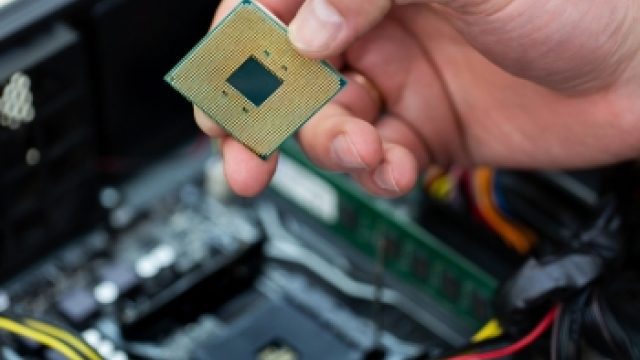In the world of laptops, a vital player silently determines the speed, power, and efficiency of your device – the processor. Have you ever wondered, “What is a good processor for a laptop?”
Well, let’s embark on a journey to uncover the secrets behind laptop processors, delve into their intricacies, and equip you with the knowledge to make an informed choice.
Core Power for Speed
At the heart of every laptop’s processing prowess lies its central processing unit, or CPU. This electronic brain, akin to a car’s engine, propels your laptop through tasks with varying complexities.
The question of what makes a good processor revolves around its core power. Imagine the processor’s cores as diligent workers – the more cores they have, the more tasks they can handle simultaneously.
For instance, a dual-core processor juggles basic tasks like browsing and word processing, while a quad-core processor excels in handling graphics and light multitasking.
Laptop CPU Insights
To decode the enigma of a good processor for a laptop, let’s peek into the key attributes that define their prowess.
Clock speed, measured in gigahertz (GHz), indicates how quickly the processor can execute instructions. However, it’s not just about speed; efficiency matters too.
Enter the architectural design – a processor’s blueprint that determines its efficiency and performance. Manufacturers continually refine these designs, resulting in leaps in processing might.
Choosing Laptop Processors
Picture this: you’re strolling through a tech store, surrounded by an array of laptops boasting an assortment of processors. How do you make the right choice? The secret lies in understanding your needs.
An office warrior might find solace in a mid-range processor, while a gaming enthusiast craves the vigor of a high-end one. Balancing your usage patterns with your budget is the key to landing the ideal laptop processor.
Processing Might Matters
Imagine you’re editing a video, streaming music, and working on a hefty spreadsheet simultaneously. This is where processing might truly matters. A robust processor minimizes lag and ensures smooth multitasking.
The cores team up to execute these tasks, akin to a symphony orchestra playing in harmony. More cores equate to a more harmonious performance, especially when running resource-intensive applications.
Laptop Speed Demands
In today’s fast-paced digital realm, a laptop is more than a tool; it’s a lifeline. The speed at which your laptop boots up, launches applications, and performs tasks can either elevate your productivity or leave you exasperated.
A good processor drastically reduces the waiting time, ensuring that you can swiftly dive into your work, entertainment, or creative endeavors.
Optimal CPU Traits
When hunting for a laptop processor, keep a discerning eye on a few key traits. Cache size, the processor’s short-term memory, directly affects its speed and efficiency.
A larger cache translates to better performance. Additionally, keep an eye on threads – these virtual cores mimic physical ones, enhancing multitasking.
Threads enable you to switch between tasks effortlessly, keeping your laptop responsive and spry.
Related Article: Laptop Overheating While Gaming: Solutions, Prevention Tips
Laptop Processor Picks
Let’s navigate through a selection of laptop processors that have garnered praise for their exceptional performance.
The Intel Core i7 series, revered for its balance between power and efficiency, caters to professionals and enthusiasts alike.
On the other side of the spectrum, the AMD Ryzen series boasts impressive multi-core performance, catering to the demands of content creators and gamers.
Powering Laptop Tasks
As you contemplate the ideal processor, consider the tasks that will form the cornerstone of your laptop usage.
If your endeavors lean towards graphic design, video editing, or 3D rendering, a processor with higher clock speeds and multiple cores becomes paramount.
Conversely, if your laptop primarily serves as a browsing and document editing hub, a mid-range processor should more than suffice.
The CPU Quest
Unraveling the mystery of what constitutes a good processor for a laptop can be likened to an epic quest. Just as medieval knights sought the Holy Grail, laptop users seek the CPU that transforms their digital experience.
Every upgrade in processing power is a step closer to attaining that coveted seamless multitasking, effortless application launches, and glitch-free gaming sessions.
Laptop Brain: CPU
Think of your laptop’s processor as its brain, orchestrating a symphony of computations to fulfill your desires. Much like a maestro guiding musicians, the processor directs data flow, ensuring that your laptop functions harmoniously.
The choice of a good processor thus determines the quality of this symphony – smooth and melodic or disjointed and cacophonous.
Top Laptop CPUs
In the realm of laptop processors, certain names stand out as the paragons of processing might. Intel’s Core i9 series, a pinnacle of power and innovation, commands respect among enthusiasts.
This series marries cutting-edge technology with unmatched performance, catering to those who demand nothing but the best. AMD’s Ryzen 9 series, a formidable contender, gives Intel a run for its money, particularly in tasks demanding substantial multi-threading capabilities.
Related Article: How to Use F3 on Laptop: Comprehensive Guide
Laptop Processor Guide
Are you ready to dive into the depths of choosing the right processor for your laptop? Let this guide be your compass. Understand your needs, consider your usage patterns, and align them with a processor that amplifies your digital experience.
Whether you’re a student, a professional, or an entertainment enthusiast, there’s a processor waiting to transform your laptop into a dynamic powerhouse.
CPU: Laptop Essential
In the mosaic of laptop components, the CPU stands as an essential piece, akin to the heart in the human body.
It breathes life into your laptop, dictating how it responds to your commands and performs its duties.
A good processor guarantees that your laptop keeps up with your pace, seamlessly handling whatever tasks you throw its way.
Picking Laptop Power
As you embark on the journey of picking the right laptop processor, remember that power is a double-edged sword.
While a high-powered processor ensures swift performance, it also demands more energy, potentially affecting battery life.
Balance becomes key – select a processor that harmonizes with your usage, neither overpowered nor underwhelming.
Laptop Processors 101
In this crash course on laptop processors, we’ve navigated the intricacies of choosing the best one for your needs.
From understanding core power to delving into architectural designs, you’re now armed with knowledge to make a decision that aligns with your digital ambitions.
So, the next time you ponder, “What is a good processor for a laptop?” you’ll do so with confidence, knowing that the heart of your laptop beats stronger than ever.
FAQs About What is a Good Processor for a Laptop
What is a good processor speed for a laptop?
A good processor speed for a laptop generally falls within the range of 2.5 to 4 GHz.
This ensures smooth multitasking and efficient performance for everyday tasks.
What processor do I need for my laptop?
The processor you need for your laptop depends on your usage. For basic tasks like web browsing and word processing, an Intel Core i3 or AMD Ryzen 3 processor is sufficient.
For more demanding tasks, consider an Intel Core i5 or AMD Ryzen 5.
Which processor is best for a home laptop?
For a home laptop, an Intel Core i5 or AMD Ryzen 5 processor is an excellent choice.
These processors strike a balance between performance and energy efficiency, suitable for a wide range of tasks including entertainment and light productivity.
What is a good processor for a work laptop?
A work laptop benefits from a powerful processor such as an Intel Core i7 or AMD Ryzen 7.
These processors handle intensive tasks like data analysis, software development, and multitasking with ease, enhancing productivity.
Which is more important, RAM or processor?
Both RAM and the processor are crucial for a laptop’s performance.
The processor handles tasks while RAM stores data for quick access. Balancing the two is essential for optimal performance; neither can be neglected.
What is a good RAM for a laptop?
For most users, 8GB of RAM is sufficient for everyday tasks.
If you use resource-intensive software or multitask heavily, consider 16GB or more for smoother performance.
How much processor do I need for a laptop?
The amount of processor power you need depends on your usage.
Basic users can opt for a dual-core processor, while power users and gamers should consider quad-core or higher processors for better performance and responsiveness.
What makes a laptop fast?
Several factors contribute to a laptop’s speed, including the processor, RAM, storage type (SSD preferred over HDD), and graphics performance.
A well-balanced combination of these components ensures a faster overall experience.
How do I choose a processor?
When choosing a processor, consider factors like the number of cores and threads, clock speed, and cache size.
Also, research benchmarks and reviews to ensure the processor meets your performance needs.
What makes a laptop faster, RAM or processor?
Both RAM and the processor contribute to a laptop’s speed. A balance is crucial: the processor handles tasks, while RAM stores data for quick access.
Insufficient RAM can lead to slowdowns, and a powerful processor with limited RAM won’t reach its full potential.
Final Thoughts About What is a Good Processor for a Laptop
In the ever-evolving landscape of laptop processors, the quest for a good processor is akin to finding the perfect balance between power and efficiency.
It’s not just about numbers; it’s about aligning the heart of your laptop with your digital ambitions. Whether you’re a creative, a professional, or an avid gamer, the processor’s role in shaping your experience cannot be overstated.
So, as you embark on your laptop journey, remember that the right processor isn’t just a component – it’s the dynamic force propelling your aspirations to new heights, ensuring that your laptop becomes a reliable companion in your pursuit of excellence.


